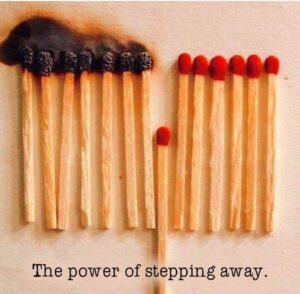 “You just need enough bravery for the next step, not the whole staircase”
“You just need enough bravery for the next step, not the whole staircase”
Avoidance is one of the many styles we have to choose from when it comes to our relational disputes. As with other styles we have come to learn and use, for whatever reasons we do so, they become habitual and changing them is a huge challenge.
The reality is that avoiding conflict is one of the most common methods for managing conflict and having this pattern may mean, among other things, we let our fears take over. It may mean not speaking out and expressing our feelings and our truths. It may mean we are afraid to confront the other person for their bad behaviour – afraid to stand up for ourselves. Further, we may fear a backlash (we imagine or know could happen from previous experience) we cannot control or want to deal with. Our fears prevail – fears of alienating and upsetting the other person beyond repair, fears of saying things we will forever regret, fears of having to deal with the unsettled and prolonged reactions – ours and theirs, fears about not trusting ourselves, and so on. These and other fears keep us from feeling brave and addressing the issues in dispute and its impact on us and the relationship*.
What happens to many of us when we consider raising an issue with another person or when we feel stung by what they have said or done is that we want things to get resolved and for things to be better as soon as possible. We want the other person to understand what we are asking for, saying or disputing without things negatively escalating between us. The pathway of getting through and then, past what occurred in our disputes feels onerous at these times and we experience a range of physical and emotional reactions which are difficult to navigate. We do not feel strong and courageous.
*(I am not talking here about the experiences and fears of physical, verbal and emotional abuse. Rather, this blog and other Conflict Mastery Quest(ions) blogs are about interpersonal disputes i.e. arguments and other interactions where we and another person (or persons) are sparring about issues important to us – not including abusive behaviours. Some of us may, of course, experience the interactions as abusive and some of the questions below may not apply.)
This week’s blog considers the little steps it takes – one by one – to move forward in these sorts of situations. I suggest you bring to mind a situation you want to address with the other person and you are feeling fearful about doing so as you answer the following questions.
- What is the situation that is causing you concern?
- About what are you most fearful?
- Which of those fears are least likely to happen? Which of those fears are most likely to happen?
- What are the main issues in dispute for you? What do you think the main issues are for the other person?
- What’s most important to you regarding this dispute?
- What outcome might the other person want? What makes that important to them?
- What will you stay away from saying? What will you say if you get provoked that will help you get through this? What other intentions may you set before proceeding?
- How do you want to “be” throughout this to remain conscious of what is important to you?
- What is the first step you might consider before you approach the other person about the situation if you decide to proceed? What other steps might you need to take before you feel ready to raise the issue?
- To feel brave about taking the first step what do you need to tell yourself? What do you want to be thinking about your courage to make it a reality? What would it take to take the next steps?
- What else occurs to you as you consider these questions?
- What insights do you have now that you didn’t have before you answered these questions?
(Popular – from the archives)



 I found this picture to be so poignant. It made me think of how combustible interpersonal disputes can be – literally – and how the toxicity and negativity can spread so easily. And the spread is not just to the other person in the dispute. But, it is also to anyone who might be near, who might overhear the heated exchange, who might listen reluctantly or even with interest as the people in dispute convey what happened in their perceptions, or it might be anyone else who is otherwise impacted by the dispute.
I found this picture to be so poignant. It made me think of how combustible interpersonal disputes can be – literally – and how the toxicity and negativity can spread so easily. And the spread is not just to the other person in the dispute. But, it is also to anyone who might be near, who might overhear the heated exchange, who might listen reluctantly or even with interest as the people in dispute convey what happened in their perceptions, or it might be anyone else who is otherwise impacted by the dispute.